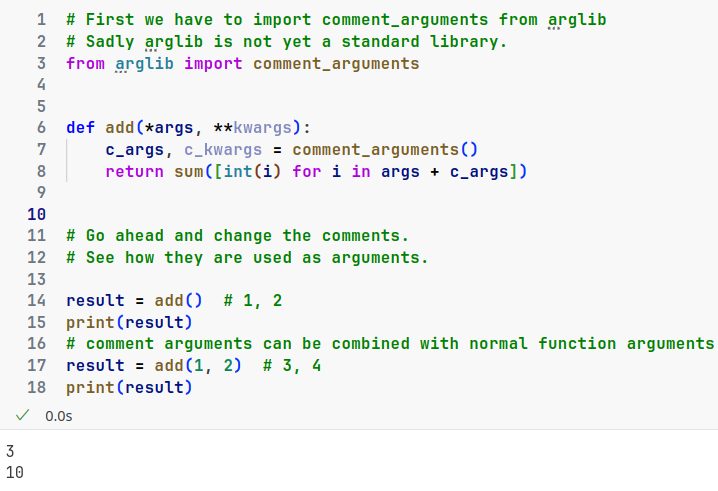Python allows programmers to pass additional arguments to functions via comments.
Now armed with this knowledge head out and spread it to all code bases.
Feel free to use the code I wrote in your projects.
Link to the source code: https://github.com/raldone01/python_lessons_py/blob/v2.0.0/lesson_0_comments.ipynb
Image transcription:
# First we have to import comment_arguments from arglib
# Sadly arglib is not yet a standard library.
from arglib import comment_arguments
def add(*args, **kwargs):
c_args, c_kwargs = comment_arguments()
return sum([int(i) for i in args + c_args])
# Go ahead and change the comments.
# See how they are used as arguments.
result = add() # 1, 2
print(result)
# comment arguments can be combined with normal function arguments
result = add(1, 2) # 3, 4
print(result)
Output:
3
10
This is version v2.0.0 of the post: https://github.com/raldone01/python_lessons_py/tree/v2.0.0
Note:
v1.0.0 of the post can be found here: https://github.com/raldone01/python_lessons_py/tree/v1.0.0
Choosing lib as the name for my module was a bit devious.
I did it because I thought if I am creating something cursed why not go all the way?
Regarding misinformation:
I thought simply posting this in programmer humor was enough.
Anyways, the techniques shown here are not yet regarded best practice.
Decide carefully if you want to apply the shown concepts in your own code bases.

It's quite useful to parse comments and generate documentation from them, either as plain old hypertext or in your editor with LSP.
That sounds fine if you have something reading the file independently. But the actual executable code should not be able to access its own comments.
Comments aren't normally accessible unless you (independently) open and read the source code file as you would with any arbitrary file.
capability is fine. Conflation is stupid. You can also use code to erase itself, but thinking that's a good idea is generally wrong. But to remove that, you also remove the general ability to erase files.